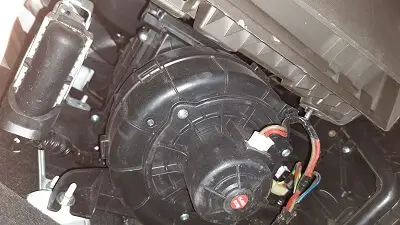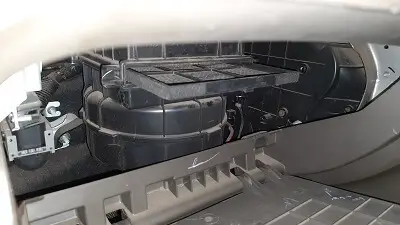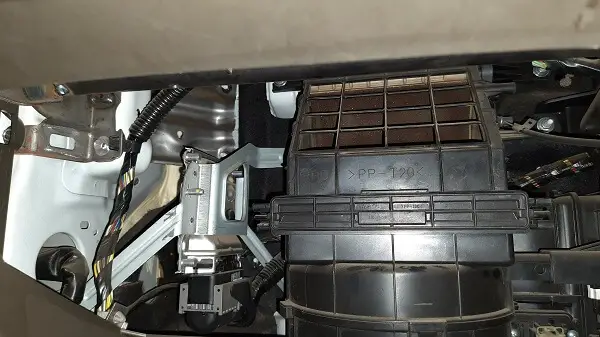The cabin filters were pretty much unheard of in cars until the late 1990s except the high-end luxury cars.
Everyone knows that there is an engine air filter present in the vehicle and its importance of sending clean air to the engine intake system but most people do not know the existence of a cabin air filter and its role in keeping the cabin air clean for breathing.
If you are frequently getting allergic symptoms after traveling in your vehicle, then the thought that do all cars have cabin air filters might have crossed your mind sometime?
The short answer is No. All cars do not necessarily have cabin air filter, it depends on the the year of manufacturing of the vehicle and the target car buyers.
Have you also encountered a similar question? Then you are at the right place! Here in this article, you would get to know all the required info about this topic.
Table Of Contents
How Does Cabin Air Filter Work?

We all know that the importance of maintaining and replacing the engine air filter as it is directly related to the proper functioning of the engine and any malfunction or clogging of the engine air filter would mean that your vehicle would misbehave and gives poor response and performance.
But we do not give equivalent importance when it comes to a cabin air filter, as it is not that essential for the vehicle running but would be necessary for maintaining a healthy atmosphere inside the cabin.
The cabin air filter is required to prevent harmful pollutants and allergens like pollen, dirt, dust, and other foreign matters from entering the vehicle cabin through the HVAC unit air vents.
The cabin air filter even though seems a minor component of a vehicle but plays an important role in maintaining the health of both the occupant and the HVAC unit.
The cabin air filters are basically particulate filters pleated in some typical shape and have mesh layers whose aperture size doesn’t allow particles greater than 3 to 10 microns in size to traverse across it.
The cabin air filters are usually designed to hold dust up to a few grams. The dust holding capacity of the air filter varies based on the design and the number of layers of mesh.
Once the dust holding capacity of the cabin air filter is reached, then it will increase the air pressure drop and would reduce the airflow across it.
Do All Cars Have Cabin Air Filters? Why Do Some Cars Not Have One?
More than 95% of all new modern cars plying on the road now a day have the cabin air filter inbuilt in the climate control HVAC unit (Heating, Ventilation, and Air conditioning unit) to ensure healthy and clean air for breathing under different running conditions. It indeed keeps your vehicle interior clean as well.
But it is not the case with the older vehicles in which they do not have a cabin air filter as it was not considered necessary then. It was only after 1990s the concept of providing cabin air filter came into existence in cars.
Article you may like to read “Does a 2013 Ford F150 Have a Cabin Air Filter? Get Your Queries Answered!“
Also if you happen to come across some of the older cars in which there is no cabin air filter, you feel uncomfortable and experience weird smells, you may be wondering why do some cars not have cabin air filters?
There are many reasons for not providing cabin air filters in older cars and it depends on the consideration of the manufacturer and the environmental conditions that prevailed then.
Below are a few reasons why do some cars not have cabin air filters.
Good air quality
Probably the quality of air available in general before the 1980s was pretty good and hence the car manufacturers didn’t feel the necessity of providing the cabin air filter. That’s why some cars you may notice do not have cabin air filters.
It is obvious that in older days, there were fewer industries hence there were less pollution and people had good immunity against allergens hence the cabin air filter may not be provided then.
But the expansion of industries gave rise to harmful pollutants in the air we breathe and OEM’s felt the need of providing cabin air filter in modern vehicles.
As the awareness about the impact of pollutants on the health of individuals increased among the public, people understood the importance of having a cabin air filter to ensure that allergenic response doesn’t get triggered. Hence the vehicle OEM’s started providing cabin air filter in the late 1990s.
Target customer
Some vehicles are meant to be sold considering the usage condition of the probable customer targeted for the vehicle.
For those segments of vehicles, providing a cabin air filter was not considered as essential, hence all cars do not have essentially have a cabin air filter.
But some of the luxury cars even if it old model may have a cabin air filter since it adds value for the money which the target customer is willing to pay.
For example, if the target customer for a certain model of vehicle is fleet owners, then the fleet manager will not welcome the idea of replacing the cabin air filter after say every 15000 to 20000 miles depending upon the atmospheric conditions.
Why he would be happy to pay a few bucks for a maintenance item like a cabin air filter? Isn’t it?
Was not need of the hour
The thinking behind some cars do not have cabin filter may be that they do not feel it is necessary, as we are breathing the same air as if we were walking down the street.
But if you are frequently getting infected by the allergic air having some pollen, dust, or smog, you will definitely need one.
Robust HVAC systems
Earlier HVAC systems were robust enough to sustain dust and foreign matters that are entering the unit without adversely affecting the function of the components involved.
Hence it was not a must to have a cabin sir filter in all cars to protect the HVAC unit from foreign matters.
But modern HVAC systems are more refined and built to precisely control the performance of the air conditioning unit than the cars of the 1990s.
The cables which are used to operate the vent flaps and diverters in old cars are replaced by servo motors and vacuum-driven mechanisms in modern vehicles. Hence the necessity to provide cabin air filters in new models.
What Happens If You Have No Cabin Air Filter?
It is ok to drive without a cabin air filter but keep in mind that you would encounter a few issues mentioned below. If you are ok with it, then probably it will not trouble you much and you can drive your car without a cabin air filter.
Poor HVAC performance
If you do not have a cabin air filter then the dust would get accumulated over the evaporator core.
This will reduce the heat transfer which happens between the refrigerant and the incoming air that is to be conditioned, eventually leading to reduced ac performance like less cooling or heating effect as the case may be.
You may need to clean the evaporator and condenser coil with a good evaporator coil cleaners to clean the core areas for better heat transfer efficiency.
It is worthwhile to note that, if the cabin air filter is available but it not replaced even after 15000 miles, then also you would get reduced HVAC cooling or heating performance.
If the cabin air filter was an OE fitment but you are running with none, then it would increase the airflow as the filters usually create pressure drop and reduce the airflow across it.
You need to take into account that too much airflow over the heater core would reduce the duct temperature much and you would feel uncomfortable as the system would not perform as expected during the winter season.
Poor air quality
It is obvious that if you do not have a cabin air filter then you would bound to get unfiltered air from outside through the air vents considering that you are keeping ac in fresh air mode.
This would affect the quality of air in the cabin as it would consist of all kinds of unwanted foreign matters and may trigger allergic responses depending upon the sensitivity and immunity of the occupant.
Blower motor failure

The blower motor is the part that sucks the air and forcefully circulates the same over the evaporator or the heater core to ensure the required airflow rate to keep the cabin compartment at a comfortable level.
If you do not have cabin air filter, the blower motor would start sucking unfiltered air with the pollutants along with the outside air and foreign matters may get caught inside the motor’s fan blades.
Over some period, the dirt accumulation would make the motor run harder and may damage the fan blades and would burn it out, leading to less air circulation, reduced cooling performance unless the blower motor is replaced by a new one.
Unpleasant smell
No cabin air filter would mean that the incoming air involves dust, dirt, and other foreign matters and it would get accumulated inside the duct over a while.
The foreign matters would get decayed and starts releasing unpleasant odor which eventually gets carried away by air and would get released through the air vents into the cabin area where you would experience weird smell.
You may need to use automotive HVAC air car freshener and cleaner, if you want to get rid of unpleasant smell in your car cabin.
Health hazard
The build-up of organic matter inside the ventilation ducts along with the moist surroundings prevailing inside the ducts will become a favorable environment for bacteria and mold spores to grow in the absence of cabin air filter.
The microorganism that grows inside the ductwork would find its way to enter the cabin compartment. Health problems start once you inhale the allergy-triggering agents.
Defogging issue
If you do not have cabin air filter, the air inside your vehicle gets contaminated and it would get settled over all the glasses and surfaces. You may notice that it leads to poor de-fogging of windows.
Since the dust particles would leave a stain over the window glasses and would affect the visibility.
This can make it challenging to see through your windows in cold or humid weather.
Running With No Cabin Air Filter? What Are The Alternatives?

It is not that bad to not have a cabin air filter. How much worse depends on how much you are prepared to withstand the symptoms of not having a cabin air filter.
If you are running with no cabin air filter but want to get rid of the allergens that are impacting your health, then here are a few things that you could do to reduce the adverse effects in the absence of a cabin air filter.
Keep HVAC in recirculation mode
If you are running with no cabin air filter and you don’t want dirt to ingress inside the cab, then it is advisable to set the HVAC in recirculation mode most of the time rather than in fresh air mode from outside for which the cabin air filter is required.
This is one of the effective tools in keeping your cabin compartment free of airborne pollutants and allergens.
This also keeps the heater and evaporator cores clean and you would get maximum heat transfer efficiency and hence the cooling and heating effect from the HVAC unit.
It is worthwhile to note that there is no need for the air filters in the recirculation mode assuming that the initial cabin atmosphere is clean and good for breathing.
This is because the HVAC unit simply re-circulates the cabin air again and again and work in a closed-loop and doesn’t allow entry of air from outside.
Retro-fit cabin air filter
Since many older vehicles do not have a cabin air filter, people explore to use a custom-made air filter in the path of the air ducts. These are generally available at any auto shop.
If you open the grill or cowl under the windshield wipers, you would be able to see an inlet opening area where the required size of cabin air filters can be deployed but some precautions need to be followed.
Since the vehicle models in which cabin air filter is not OE fitment, the ac units may not be designed for the presence of cabin air filter, this may cause issues for your AC functioning so there is a word of caution before using one.
Hence while doing so you need to make sure that the filter mesh is not super fine but needs to be a bit oversized. This is because an air filter creates a pressure drop across it and restricts the airflow as well.
If your AC doesn’t work very well even now, then make sure that this potential modification doesn’t make it worse.
Use HVAC cleaners
If the weird smell is the real problem in your truck, then it is ok to run your car without a cabin air filter. This is because there are some special automotive HVAC anti-fungal cleaners are available in the market to get rid of the weird smell in cabin.
If you take the vehicle to a professional dealer then they also use some special chemicals to get relief from this problem.
Basically, the cleaners wipe off the allergens from the evaporator core and the duct channels which produces this vinegar kind of smell.
Clean the cowl area
Running with no cabin air filter would not be an issue but often the channels through which the outside air is fed into the HVAC unit are filled with dried leaves, twigs, and other foreign particles under the cowl of the vehicle.
These coarse matters reduce the inlet opening area for the efficient functioning of the HVAC unit and thereby affects the airflow rate and speed from the air vents.
You may notice that you are sweating like there is no AC inside the car especially during scorching summer hot days.
You can drive your car without a cabin air filter if you regularly clean the cowl area and prevent any accumulation of coarse matters into it.
Final Thoughts
All cars do not necessarily have cabin air filters for filtering out the outside air that is getting into the passenger cabin.
Especially it is true for old cars where the HVAC system is either robust enough to sustain dust particles getting accumulated onto the evaporator core or there was no customer requirement considering the condition prevailed then.
We also discussed why do some cars not have cabin air filters and the probable logic behind the same.
If you are already accustomed to the problems which may occur in the absence of cabin air filters like allergies, low HVAC cooling and airflow, etc., then probably you need not worry. You are already prepared for not having a cabin air filter.
If you notice that you don’t have a cabin air filter in your vehicle, don’t worry, it’s not the end of the world, be relaxed!
It is normal to not have a cabin air filter in older vehicles. If you follow certain precautions as discussed earlier, it would help in tackling the issue of a no cabin air filter.
Hope with this info you would be at least empowered with the actions to be taken if you do not have a cabin air filter.
Happy motoring!
References
https://www.quora.com/Do-all-cars-have-cabin-filters-If-not-how-do-they-filter-the-air
https://www.rav4world.com/threads/running-with-no-cabin-filter.275633/
https://www.mdxers.org/threads/is-there-any-harm-to-driving-without-a-cabin-air-filter.40471/
Related Articles
Does a 2013 Ford F150 Have a Cabin Air Filter? Get Your Queries Answered!
AC Compressor Leaking Green Fluid? 5 Reasons And Solutions To Fix It!

